Guitar round table: Mark Tremonti, Eric Friedman, Andy James and Dan Woodyer talk
Techniques, tones and drunken mishaps with Tremonti and Wearing Scars
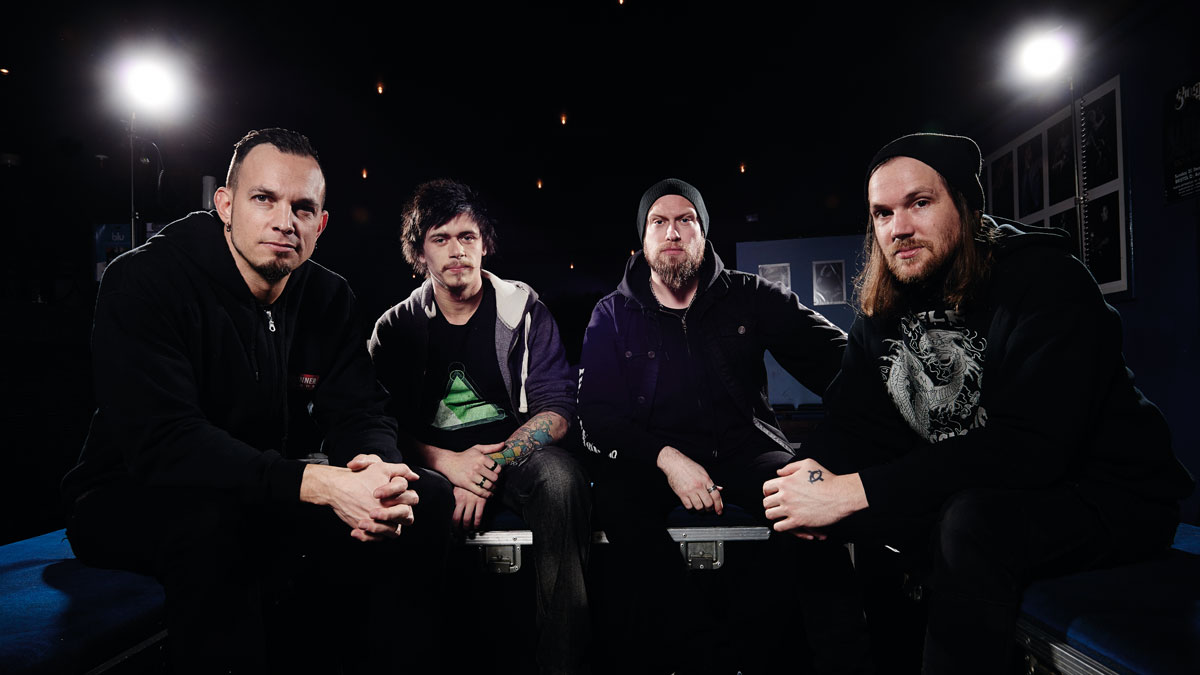
Introduction
As Tremonti and Wearing Scars hit the road together, we sit down with Mark Tremonti, Eric Friedman, Andy James and Dan Woodyer.
The first time we met I was drunk. I bumped into him at Disneyland
If you want to hear how melody and technical progression can flow in heavy harmony, look no further than Tremonti and upcoming Brits, Wearing Scars. We sat down with mark Tremonti and Eric Friedman of the former, with touring buddies Andy James and Dan Woodyer to get their insight and advice on tone, technique, signature styles and why your mids matter…
Musically there’s a lot of crossover here, but have you guys met before?
Mark: “This is the first time we’ve toured together but I’ve met Andy before…”
Andy: “The first time we met I was drunk. I bumped into him at Disneyland.”
Mark: “It was a Steel Panther concert at the House Of Blues.”
Andy: “I’d lost my money, that’s why I was walking backwards trying to find it - I bumped into him and said, ‘Fucking hell it’s Mark Tremonti!’”
Don't Miss
Mark Tremonti: the 14 records that changed my life
Andy James shred guitar lesson

Songwriting sensei
What do you admire in each other’s playing?
Andy: “Well we’ve been trading licks all tour. Mark’s songwriting is something I’m really into. Having spanned a career of 20 years writing with three different bands, you think he must run out of ideas. But he never seems to. And also the fingerstyle stuff, that kind of thing really gets me going and it’s not something I usually do, so it’s nice to learn something different.”
It’s one thing sitting down and learning from a CD, but when you have people right there I like to take advantage of it
Mark: “There’s a lot of guitar players on this tour so I’ve been talking to everybody. We’re sitting with one of the guitar players [looks at Dan] who hasn’t given me any licks yet! I’m always going around to guitarists and asking them to show me their favourite licks. Because the best way to get better is to learn from people.
“It’s one thing sitting down and learning from a CD, but when you have people right there I like to take advantage of it. And Andy’s one of those superhuman players - you hear him and, certain guitar players are good, some are great and some are off the charts. He’s one off the charts killer guitar player.”
Eric: “We sit backstage and he’ll bust out a lick during his set, we’ll hear it through the hallway and just look at each other at the same time, ‘Did you just hear that?!’”
Mark: “Then after the set I’ll say, ‘Dude, that lick in that song, show it to me!’”
Andy: “I can guarantee though, you probably lost your virginity before I did!” [everybody laughs]
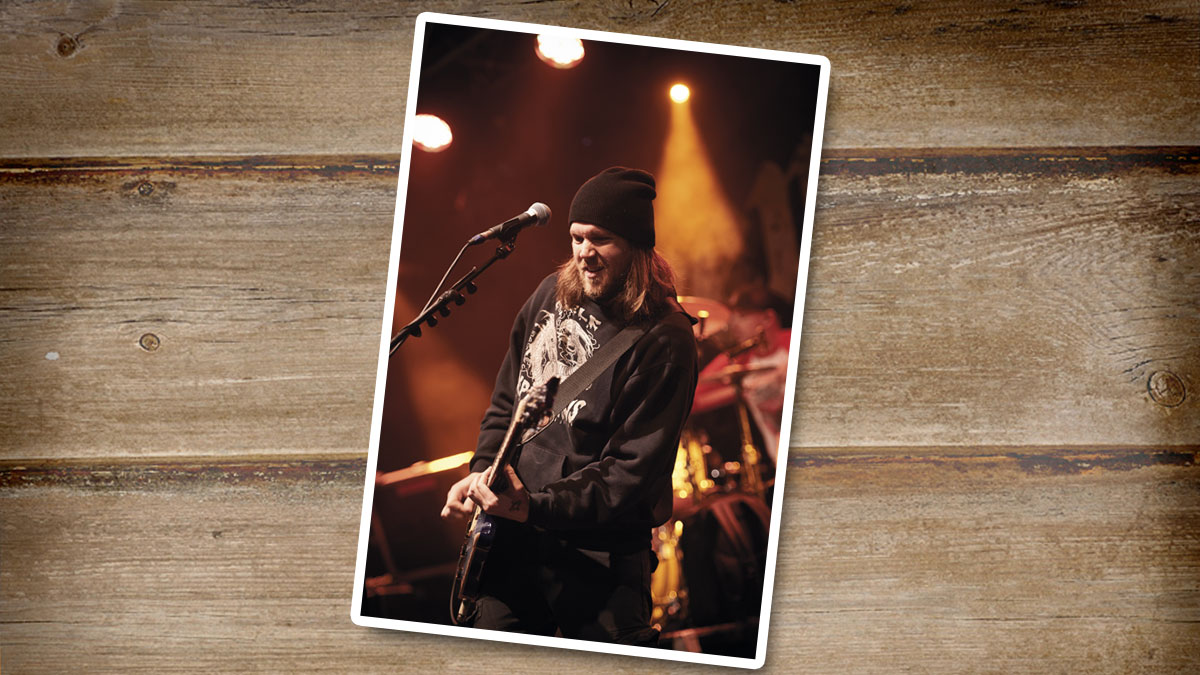
Rest routines
When you’re off-tour do you have a routine with playing?
Mark: “I made a New Year’s resolution a few years back, to play guitar for 20 minutes a day, except if I’m travelling. If you play for 20 minutes a day, it often turns into 40 or an hour or two, but as long as you get that guitar in your hands, you don’t seem to forget the roll you’re on. If I force myself to do that I feel like I get better and better. If I don’t do that, it really hurts me.”
On tour I feel like any time you hand me a guitar, I’m ready to go - I don’t need to warm up
Andy: “Do you find that if you get to a certain level and you don’t play for a week, your level drops and you have to build it back up?”
Mark: “Yes, it takes me like three days. If I went on vacation for a week and a half and I came back, I’m terrible the first day, second day I’m getting by and third day I’m back. But on tour I feel like any time you hand me a guitar, I’m ready to go - I don’t need to warm up.”
Eric: “It’s weird but for me with my style of playing, it’s not as physically demanding because I’m not a big shred guy like you guys. I’m more feel and focussed on phrasing, so it’s not more about technical ability but where I’m at in my head. Sometimes for me, if I take off a week, I’ll come back with a completely fresh set of ideas just on phrasing. It depends on what you’re doing, I guess.”
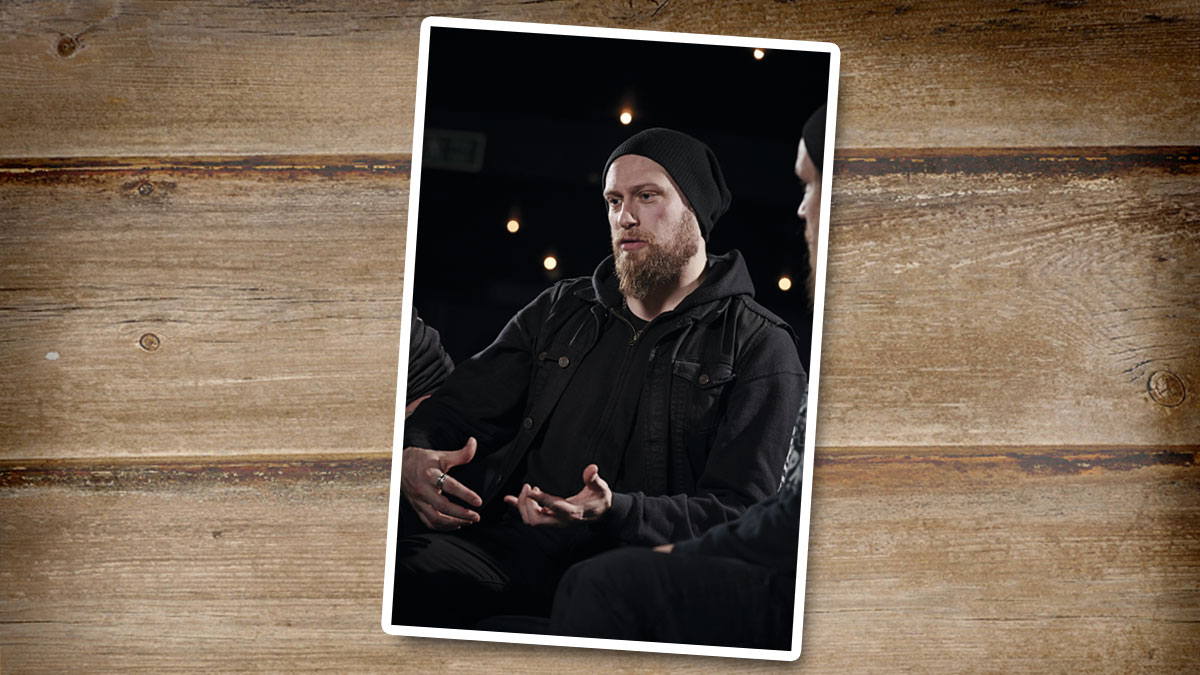
Take a break
Andy: “I think it’s a good idea to take a break from technique. A lot of my practice isn’t about how fast I can play, it is kind of like that really - exploring bluesy options. My playing now, I try to have a good balance between things that are technical but still say something that is more melodic.
You have your shred and your melodic parts and putting it all together creates a good solo
“Especially with Chris [Clancy, vocals] and the kind of stuff he writes, it would be a shame to come in for the solo section and not keep that melodic equilibrium up rather than just coming in and shredding all over the solo section. It just wouldn’t work.”
Eric: “We all love to be blown away by awesome shredding, but some of my favourite parts Mark has ever done are the catchy melodic parts of his solos. Parts that even people who don’t play guitar could sing along to.”
Dan: “Having that mixture of both is awesome. When you get those notes that sing. You have your shred and your melodic parts and putting it all together creates a good solo.”
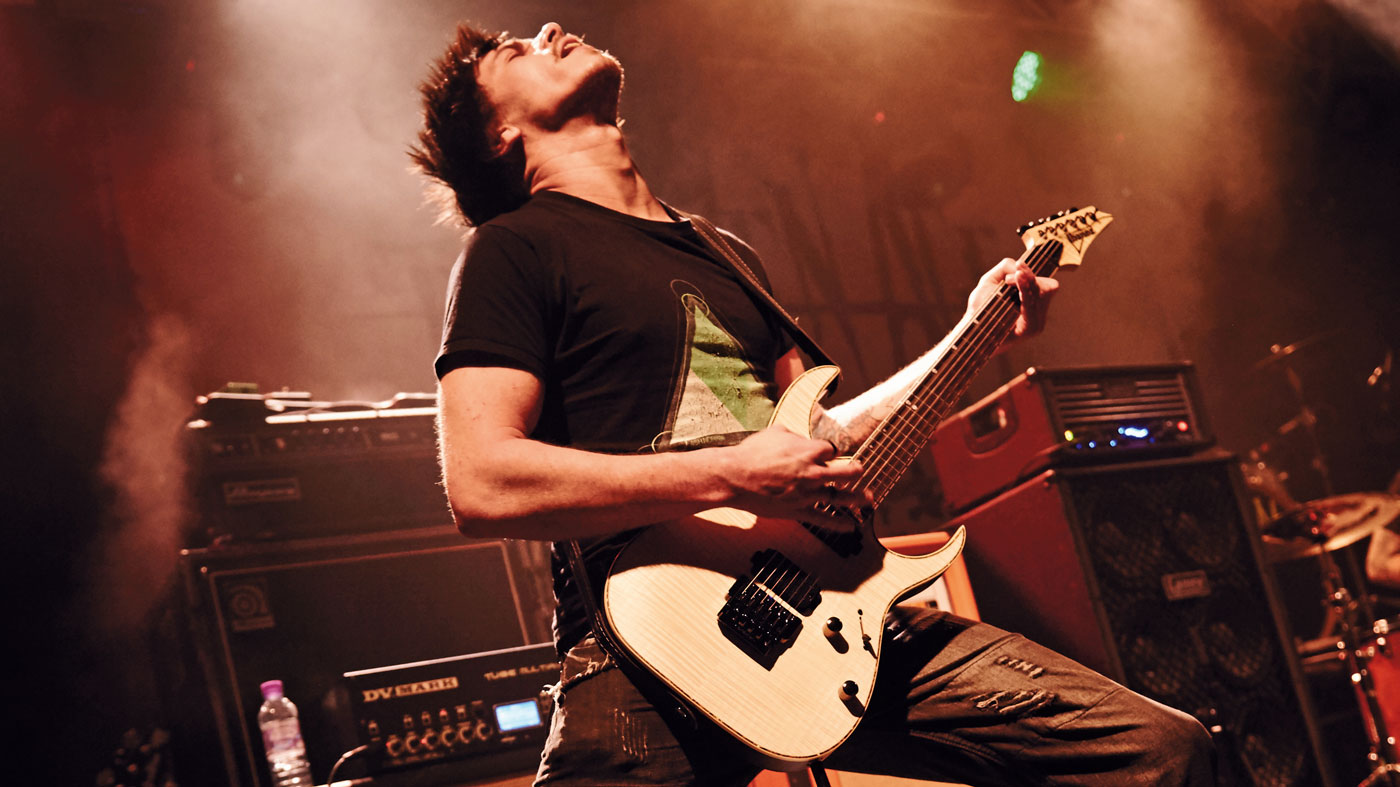
Resolutions
Anyone else have a guitar resolution for this year?
Dan: “I’m going to look at exploring new genres; things I’m not familiar with and take myself out of my comfort zone. I very often sit with rock and metal, it’s what I like doing and I know I can do it.
It’s finding those new licks that you’ve never used before and throwing them into your own style
“But when it comes to things like jazz or funk and I put on a backing track it’s, ‘No, I’m definitely shredding a metal solo over this!’ It’s finding those new licks that you’ve never used before and throwing them into your own style. Expanding that way. That’s something I’m looking at doing this year.”
Mark: “Yes, jazz is tough because you can’t just sit down and just freestyle jazz. You have to read some books, study the chord progressions. It’s not a case of putting it on and just playing over it.”
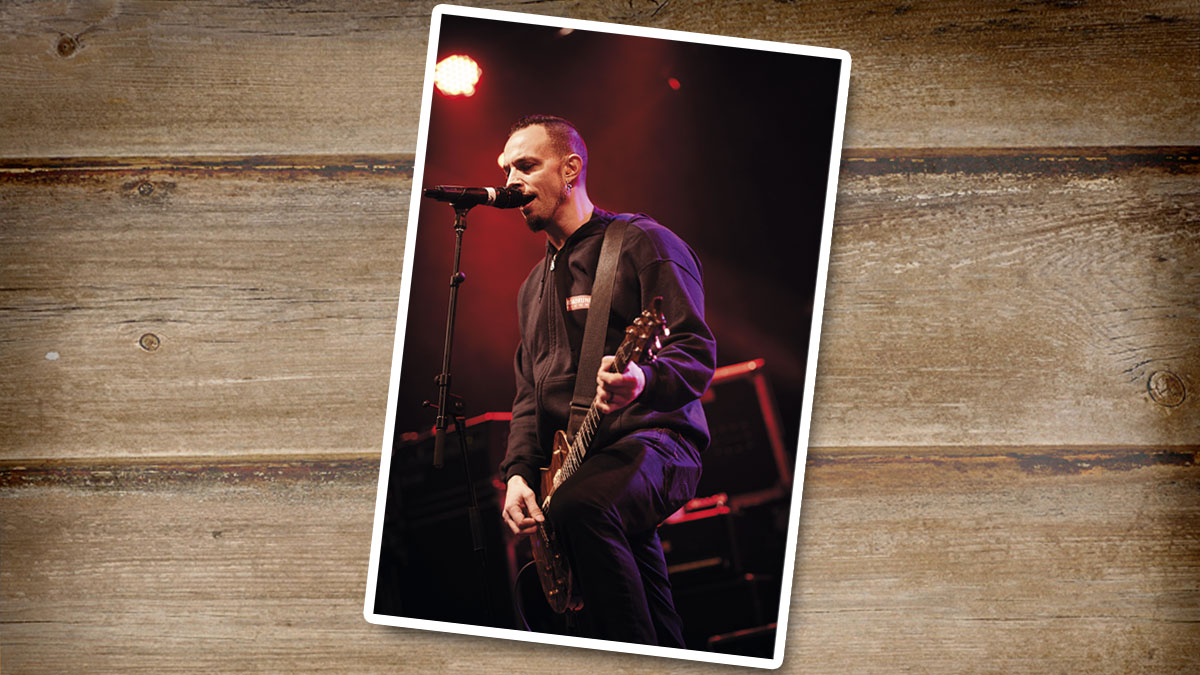
Lean on me
Every player has signature traits that form part of their style, but how does a player know when they’re leaning on them too much?
Mark: “On Fortress, I didn’t use any wah. I talked to my friend [about a previous album] who said something like, ‘I would have liked a little less wah.’ So I didn’t use any wah on the next record.
I think alternate tuning has been the best thing for me to not repeat myself as much
“And then whenever I got to the peak of a solo, I’d go into like a legato frenzy. I decided I was only going to pick one or two spots on the record where I was going to do any legato stuff.
“For the rest I tried to come up with new techniques. But you can definitely hit [the same] chord progressions a lot that you like so it’s good to come up with alternate tunings to find some different chord voicings and progressions. I think alternate tuning has been the best thing for me to not repeat myself as much.”
Andy: “I think that would make lead playing for me almost impossible because I’m so used to the framework of how the guitar is laid out…”
Mark: “That’s what’s good about it - you’ll write something you’re not used to, something you’ve never written before.”
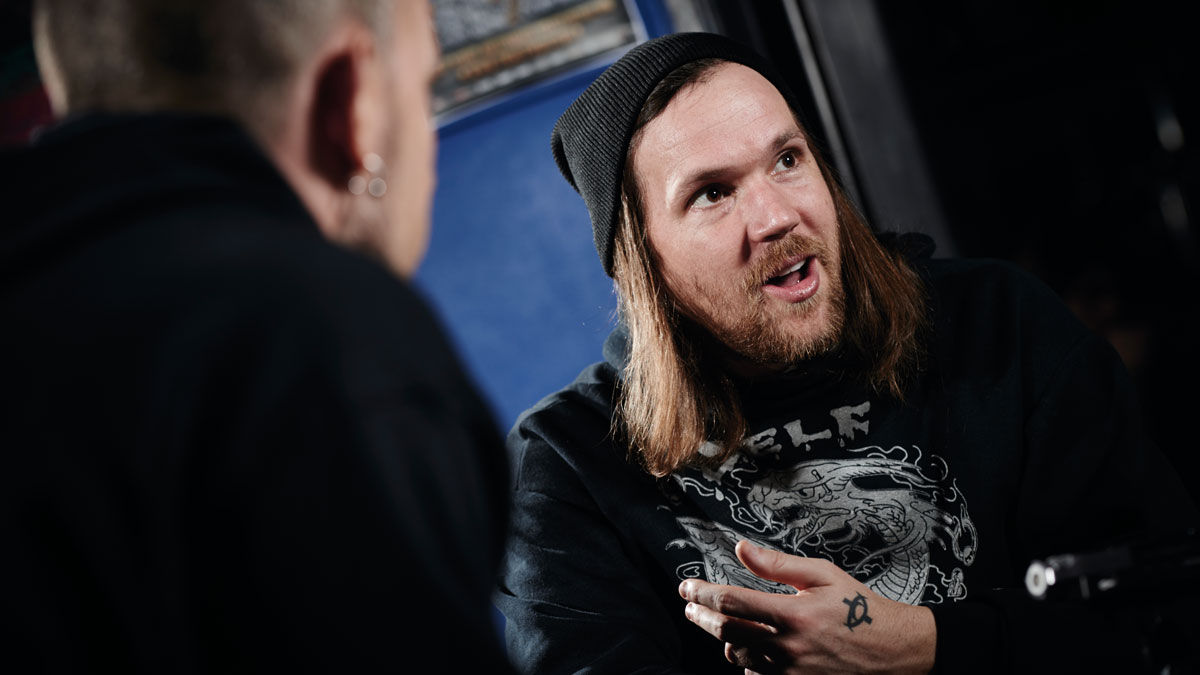
The write way
What about writing?
Eric: “It sounds kind of silly but for writing solos I will sometimes listen to the section I have to write a solo over and not have a guitar in my hands. I will have my voice recorder and sing a guitar solo; sing the most badass guitar solo I can ever do and not make myself play the same notes as I normally would.
When what you’re hearing in your head is happening on the guitar, that’s when you’ve become Yoda!
“Different notes will come through my voice rather than sticking to the same scales I always play on my guitar. When you’re singing there are no walls.”
Mark: “That’s a good drill to do. I think David Gilmour does that, too.”
Eric: “Then all of a sudden you listen back to your ridiculous-sounding voice memo and you start to learn it on guitar, playing the kind of things you would probably never have thought of before.”
Mark: “Then you can turn into a real champ like George Benson. When he does On Broadway live and he’s just singing and just making it up on the way, it’s so killer when your mind and your fretboard are all one. You can sing and play at the same time. When what you’re hearing in your head is happening on the guitar, that’s when you’ve become Yoda!”
Andy: “Like you Mark, I’m learning new stuff all the time, and in order for me to remember new stuff I put it into the next solo I’m writing. So it forces me to remember it. So that’s generally how I try not to repeat myself. I’m always coming up with new ways of playing.”

New techniques = new ideas
So learning something new in terms of technique can spark a new song idea?
Andy: “It comes from teaching because I get a lot of requests through my guitar academy. So I have to shift into another gear, like writing a piece of music just using hybrid picking.
There’s so many amps that are just good for sitting in front of playing without a band
“You’ve got to use all the avenues you know to write something like that and sometimes you’ll come up with something new and think, that fits quite well in how I play anyway but it’s something I’ve never done in a solo before.”
On the heavy side of tone, do you think that there are any common pitfalls players can fall into that should definitely be avoided?
Andy: “Hardly any mids - turn your mids up.”
Mark: “There’s a lot of amp companies, and I won’t name them because I don’t want to name anybody, but you’ll go to NAMM and plug into an amp and it will sound mean as hell and badass, but as soon as you take that into a live setting it disappears. There’s so many amps that are just good for sitting in front of playing without a band.”
Andy: “It’s getting the throw with an amp. If you don’t EQ it right you’re putting the wrong frequency down a microphone. I would go for resonance with full on bass and scoop but you then realise it doesn’t cut through. You need that mid range, and a little less bottom end to clean it up.”
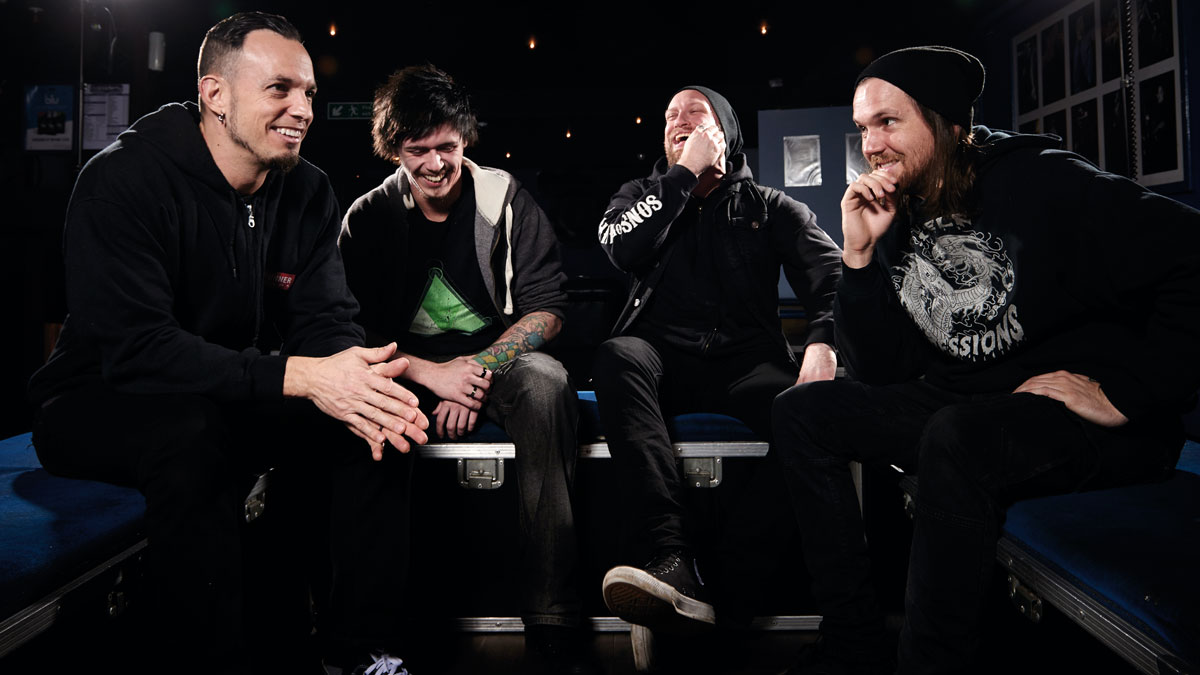
At home on the midrange
Eric: “I really feel the guitar needs midrange. Like Mark was saying, it sounds really good by itself with the mids down and a scooped tone, but once you get into a room with a band it disappears.
“I feel like what helps the guitar really cut and where they should live is the midrange. I think a lot of people put a little too much gain on their guitars too. If you dial back the gain then it makes it tighter and punchier. It really reacts.”
You don’t need all that nonsense; you need one good amp and a good speaker cabinet
Mark: “Don’t go past one o’clock on the dial. Another thing, if I could have gone back and talked to my younger self, when I worked in a car wash and saved all my pennies to buy the new rack and the new this, and the new that. You don’t need all that nonsense; you need one good amp and a good speaker cabinet. Maybe one effects rack to have fun with.
“If you like a Marshall tone, get yourself a JCM800 or 900. If you like a big heavy sound, get yourself a [Mesa/ Boogie] Rectifier or a [Bogner] Uberschall. You don’t need every single amp that’s coming out. I’ve [got more amps] recently, but I’m an amp collector now. When I was a kid, I used to think I wasn’t playing good because I didn’t have the most expensive toys.”
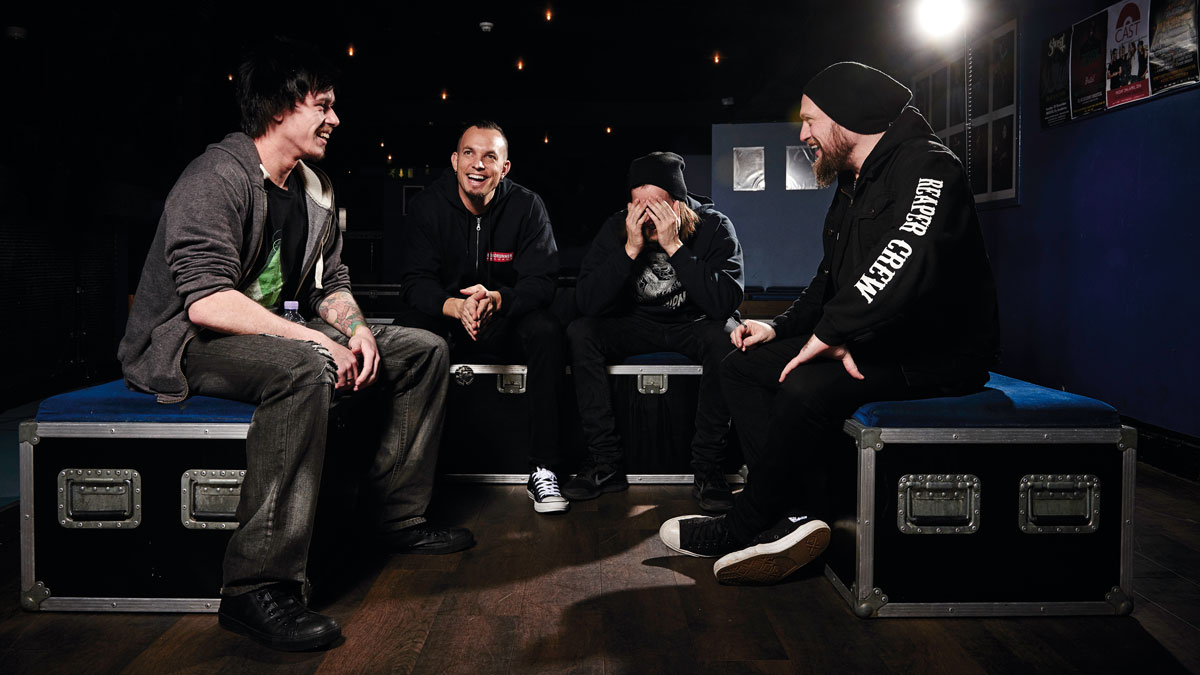
Driller thriller
All players suffer from creative droughts and lack of inspiration, are there times when you just don’t want to pick your guitar up? How do you deal with that?
If I feel that I’m not inspired songwriting-wise, I can always take a lick and drill it for an hour
Eric: “I’m never afraid to put down the guitar and do something else. When you come back with a fresh mindset, then you have a different outlook. If it’s not happening when you’re songwriting - say when you have a cool verse and you’re trying to force a chorus out, but you can’t get it - then just put it away for a little bit. Sometimes when you come back to it with a fresh outlook, then magical things can happen.”
Mark: “It could be 24 hours or an hour. You can’t force it. But as far as not wanting to pick up your guitar, if I feel that I’m not inspired songwriting-wise, I can always take a lick and drill it for an hour. You don’t have to be inspired to sit there with a metronome. You can still get better.”

Forward motion
Andy: “I’ve recently been taking breaks from playing due to muscle strain. That can stop you playing for a while. Sometimes I’ll pick up an acoustic and play that for a week. I can get bored of screaming solos and riffs. Sometimes I’ll just put a clean patch on and play some Edge-type stuff, something a little bit different.
There’s always something that you can do. I think the more roles you play the better
“Most of the time I’ll hit record, even if I’m just jamming because you never know. Sometimes you’ll play something, and you won’t be able to play it again quite right. And you’ll get some version of it but it wasn’t what you heard.”
Dan: “I’ll be playing for six hours a day and be sat there with shredded fingers, write a song and have it done in a week. Once it’s done, I’ll walk away and have a complete fresh mind and it makes me feel like I’ve got something new when I pick it up again. Then I’ll gradually pick that practice time back up - half an hour a day, then the next day an hour.”
Mark: “But there’s always something that you can do. I think the more roles you play the better. If you’re a guitar player you might get sick of playing lead guitar. If you’re a songwriter you may get tired of doing that sometimes.
“As a lyricist you may get sick of that but if you’re tired of playing guitar, sit down and work on writing lyrics. There’s always some forward motion you can have.”
Don't Miss
Mark Tremonti: the 14 records that changed my life
Andy James shred guitar lesson

Rob is the Reviews Editor for GuitarWorld.com and MusicRadar guitars, so spends most of his waking hours (and beyond) thinking about and trying the latest gear while making sure our reviews team is giving you thorough and honest tests of it. He's worked for guitar mags and sites as a writer and editor for nearly 20 years but still winces at the thought of restringing anything with a Floyd Rose.

